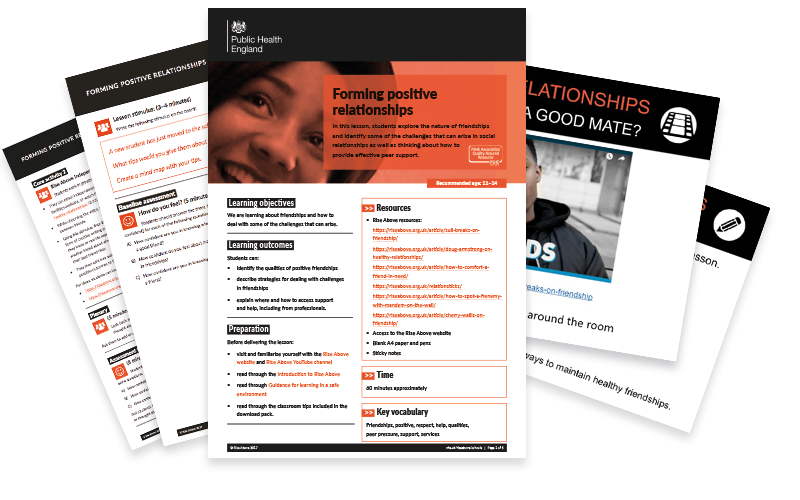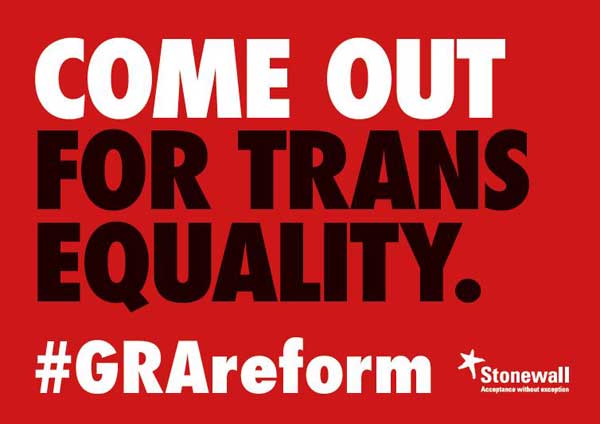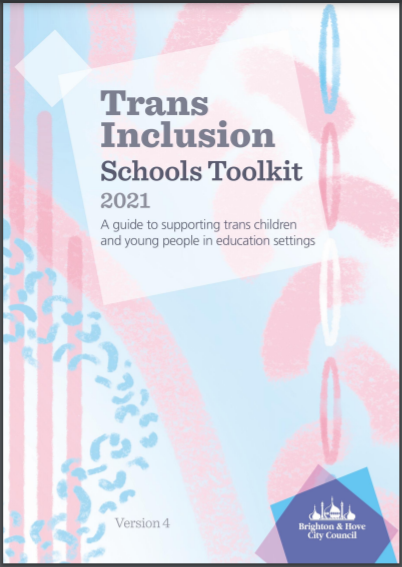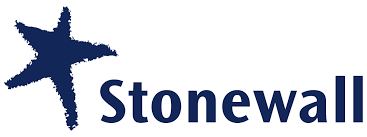Equality and Diversity - Key Stage 3&4

Forming Positive Relationships
In this lesson, students examine the nature of friendships, identify some of the challenges that can arise and how to provide effective peer support.
Using peer-to-peer discussion, scenarios and videos, students explore what makes a good friend and discuss strategies for dealing with difficult social situations.
Lesson plan includes:
- accompanying PowerPoint for use in class
- starter activities – carry out a baseline assessment of students' prior knowledge, skills and understanding
- core peer-to-peer activities, plenaries and extended learning projects
- 2 films to support the activities, including Doug Armstrong on "How to be a true friend"
Pride Month Toolkit
![]() 1st June marks the start of Pride Month, where the LGBTQIA+ community is celebrated across the UK and all over the world.
1st June marks the start of Pride Month, where the LGBTQIA+ community is celebrated across the UK and all over the world.
Pride Month is a time for all of us to reaffirm our support for LGBTQIA+ people, as well as an opportunity to raise awareness of the ongoing issues and injustices faced by the community.
It is important for pupils to feel that their school or college is a safe place to be their authentic selves, where they are encouraged to explore their identities free from judgement. This month is a great opportunity to review your existing polices to ensure your setting is LGBTQIA+ inclusive, and to run activities or lessons exploring and celebrating the LGBTQIA+ community.
In this toolkit, we’re sharing free resources for pupils and staff to celebrate Pride Month and to think about positive changes that can be made in your school or college.
Click here to download the Secondary & FE toolkit
Guidance for maintained schools and academies in England on provision for transgender pupils
Guidance has been published to support maintained schools and academies in England to offer appropriate and supportive provision for transgender pupils.
New case law is ever emerging so provision for transgender pupils should be revisited regularly.
Use this link to read the guidance material.
Trans Inclusive Schools
Top tips to make your school more trans inclusive:
-
Work with the LGBT young people in your school. Listen to them and be led by them as far as possible;
-
Celebrate difference through special events such as LGBT History Month in February. Make sure you highlight trans people and issues relating specifically to the trans community during this month;
-
Use Stonewall’s huge bank of resources. They are available free of charge on our website and can be downloaded;
-
Display posters such as those made for the Trans Day of Visibility to improve the visibility of trans people in your school;
-
Create an equality group to run your assemblies on LGBT History Month;
-
Review your school’s policies, do they cover transphobia and transphobic bullying as a specific issue and state that instances will not be tolerated? Your anti-bullying policy could give examples of transphobic language so staff and students better understand;
-
Make your policies explicit about following the Equality Act 2010 and include this in your home-school agreement so that parents are aware of how you support all pupils in your school;
-
Create a checklist for staff to follow should a student disclose to them that they are trans or questioning their gender. This could include such things as asking how the student would like to be referred to (name and pronoun) and whether the student feels they need any additional support;
-
Invite a trans speakers in to your school. Joining the Stonewall School Champion programme will give you access to trained LGBT speakers and you can request a trans speaker if you wish;
-
Review your curriculum and identify where trans people and their experiences could be included. Ideally this should go beyond PSHE and RSE curricula, as great opportunities to discuss and explore trans issues could come in English, art or drama;
-
Make information on trans issues easily available to students by creating a trans specific section on your LGBT notice board. Signpost to local and national trans youth services such as Mermaids and Gendered Intelligence.
EQUALITY ACT 2010: Advice for school leaders, school staff, and governors
Mental Health & Physical Disability
This resource comprises a mix of materials that aim to help tackle student prejudice/ misconceptions around mental health/ physical disability. Baseline data can be gathered from the questionnaire ‘I think that…’.The PowerPoint and Creature Comfort activities can be used to help students understand physical and mental health issues.
Coming Out
Coming Out - support for lesbian, gay & bisexual young people
Young Stonewall

Gender Identity Research & Education Society
A teaching resource for Secondary Science developed by Gender Matters and, Gender Identity Research & Education Society (GIRES): Transgender PowerPoint
Trans issues e-learning resources trailer:

Reform the Gender Recognition Act
The fight for equality is far from over. Speak up for trans rights and help reform the gender recognition act. Whether it's downloading A Vision For Change, contacting your MP about the Gender Recognition Act or signing up to hear more about what Stonewall is doing, there are plenty of ways to Come Out For Trans people. Click here to read more.

Trans Inclusion Toolkit
Brighton & Hove City Council’s Children, Young People and Skills Committee have produced an updated version of the Trans Inclusion Schools Toolkit for information on Equalities at all key stages of education.
• Cornwall Schools Transgender Guidance, 2012 (updated in 2015);
• Guidance on combating Transphobic bullying in schools, GIRES 2008;
• Guidance for schools on responding to sexist, sexual and transphobic bullying, DCSF 2009.
 NEU - Trans Inclusion Toolkit
NEU - Trans Inclusion Toolkit
NEU - Supporting Trans and Gender Questioning students
Click here to access the advice from the National Education Union aims to help school and college staff support gender variant or questioning students in the educational environment.
Alphabets in Stonehouse (part of the Diversity Trust)
A support group promoting their cause via a website and Facebook page: www.diversitytrust.org.uk/young-peoples-services
 Stonewall Primary Best Practice Guide
Stonewall Primary Best Practice Guide
How primary schools are celebrating difference and tackling homophobia
Stonewall Inclusive Curriculum Guide
Bi Visibility Day - 23rd September
Bi Visibility Day, also known as International Celebrate Bisexuality Day, has been marked each year since 1999 to highlight biphobia and to help people find the bisexual community. Every year on the 23rd of September, BVD celebrated bi people, while recognising the work still required to make biphobia a thing of the past. Below we have series of posters highlighting Bi Visibility Champions, and some of the work they do:
An introduction to supporting LGBT children and young people. This resource is suitable for all schools, colleges and settings and offers support in creating an LGBT inclusive environment, working with parents and carers, and supporting individual LGBT children and young people in mainstream and specialist settings.
Next steps in LGBT inclusive education: celebrating difference and developing understanding is a brand new resource, aimed at schools, colleges and settings that have already started work on LGBT inclusion and who are looking to really embed the work. This resource includes an extensive policy section, guidance on creating an LGBT inclusive curriculum, support on working with parents and carers, as well as highlighting the importance of ensuring that a wide range of LGBT people are represented and celebrated in the school, college or setting.
We’ve also been working hard to ensure that we offer schools, colleges and settings the resources they need to support children and young people with SEND as part of their LGBT inclusive approach. As well as our ‘It’s OK’ symbol supported posters, we now also offer easy read information sheets. (03/04/2020)
EACH - Educational Action Challenging Homophobia
EACH is a charity providing training, resources and support services to affirm the lives of lesbian, gay, bisexual, trans or questioning (LGBT+) people. Posters available to down for free on the website. Also SAFESPACE stickers to purchase. Click here to visit the website.
Educational Action Challenging Homophobia (EACH) offers advice and support online and through their freephone Helpline for children experiencing homophobic, biphobic or transphobic bullying or harassment.
Website: http://each.education/homophobic-transphobic-helpline
Phone: 0808 1000 143 open Monday to Friday 10am to 5pm. For All age ranges.
Gender Matter Resources from EACH - Educational Action Challenging Homophobia
Resources to tackle homophobic bullying in schools Click on the links below.
/Trans & gender questioning.pdf
/Gender Matters Resource 2 Girls Version.pdf
/Gender Matters Resource 3 boys version.pdf
LGBT in Britain - Home and Communities
Stonewall's LGBT in Britain - Home and Communities research report highlights deep challenges for the LGBT community, with alarming levels of racism experienced by black, Asian and minority ethnic (BAME) LGBT people, and a significant proportion of trans people, bi people, LGBT disabled people and LGBT people of faith feeling excluded within the LGBT community. Click here to read the full report

Rainbow Laces campaign
It’s down to all of us to be an active ally to lesbian, gay, bi and trans people in sport.
Every player, every athlete, every team is stronger when sport welcomes and supports everyone.
It’s down to all of us to become an active ally to lesbian, gay, bi and trans people.
It’s about working together, whether that’s playing for fun, playing to win, or cheering on your favourite athletes or team.
When we all play our part, we can make sport everyone’s game.
Why Rainbow Laces Matter: Lesbian, gay, bi and trans people can have negative perceptions and experiences of sport, whether it’s due to bullying in school sport, coming across anti-LGBT language on social media, down the pub or during live sports.
New Stonewall research finds that most people want to see action against anti LGBT language in sport, but only a quarter feel confident calling it out. Rainbow Laces is all about giving people the confidence and the tools to be active allies to LGBT people in sport.
Share your favourite moments from the Rainbow Laces campaign and follow the hashtag #RainbowLaces for the latest update.
I'm just me
“I’m just me... It's like coming up for air."
As Jaz and Charlie make a final attempt to keep their relationship alive, one of them comes out as non-binary (meaning they don’t identify as male or female), sparking a conversation that will change them both forever.
A film by Adam Tyler. (13/02/20)
https://www.truetube.co.uk/film/just-me?tab=film
Gay Glos
They support 14-18 year olds but they will support younger if they are mature enough.
They have youth groups, support groups for parents (run by a parent of a trans gender child), they go ito colleges and schools to deliver training re: equality and diversity, they also work with refugees and asylum seekers who are trans gender. They have a gender group for 13-18 year olds.
Gay Glos can support a child in school, if the child or young person isn’t getting the right support or understanding from school.
Free Intersectionality Training
![]() Throughout 2022, Gloucestershire County Council, Gloucestershire Fire and Rescue Service and partners are holding a series of events that promote a greater understanding of intersectionality. All events will include live captions and will be recorded and shared afterwards so sign up if you don't want to miss out.
Throughout 2022, Gloucestershire County Council, Gloucestershire Fire and Rescue Service and partners are holding a series of events that promote a greater understanding of intersectionality. All events will include live captions and will be recorded and shared afterwards so sign up if you don't want to miss out.
Intersectionality: the theory that the overlap of various social identities, such as race, gender, sexuality, and class, contributes to the specific type of systemic oppression and discrimination experienced by an individual. This series of free training events aim to promote a greater understanding of intersectionality and identity in workforces and communities.
Book your free place to attend the webinar here.
Healthy Relationships - Lesson plan for KS4
Beyond Equality - Healthy Relationships KS4 for Now and Beyond
Was the information on this page helpful? 


